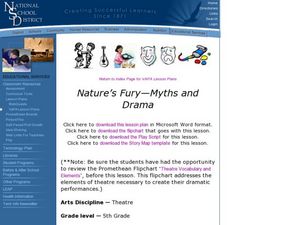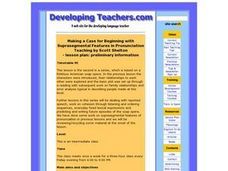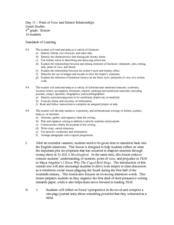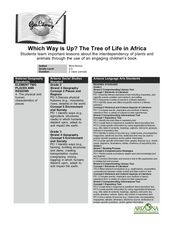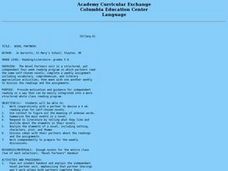Curated OER
Arts have Emotional Impact
Students explore how various artists use color, line and composition to create a mood. In comparison, students explore various elements of specific art forms that affect the viewer's emotions in dance, theater music and the visual...
Curated OER
Read It and Remember It!
Students describe and draw a picture about what happens in the book they are reading. They work in groups and read an assigned chapter. Students discuss the chapter and draw a picture to show what happens. They discuss the chapter with...
Curated OER
Nature’s Fury—Myths and Drama
Fifth graders explore the elements of theatre. For this dramatic performances lesson, 5th graders discuss the structural elements of theatre and dramatize "The Origins of the Season," an explanation myth.
Curated OER
A Midsummer Night's Dream by William Shakespeare
Students read and perform William Shakespeare's A Midsummer Night's Dream. In this Shakepeare play lesson, students read the script for the play and practice the simplified version of the play.
Curated OER
Making a Case for Beginning Wigh Suprasegmental Features in Pronunciation
Students explore the ways in which voice quality and intonation can convey meaning.
Curated OER
Narrative Literature Response Letters
Third graders write endings to a story that has already been written. They offer alternative endings in their version. The lesson includes a rubric that is to be given to the students in order that they know the requirements.
Curated OER
Duck for President
Second graders listen carefully to the story, "Duck for President" and then write and illustrate a new ending to the story; focusing on spelling sight words correctly and use complete sentences. They also work on forming letters...
Curated OER
Point of View and Mentor Relationships
Tenth graders analyze the role of mentors, point of view, and prejudice using the texts of To Kill a Mockingbird and Maya Angelou's I Know Why the Caged Bird Sings. In this literature analysis lesson, 10th graders review Scout's...
Curated OER
Which Way is Up? The Tree of Life in Africa
Students read a book titled This is the Tree about a baobab tree and draw a picture and label the tree. In this tree lesson plan, students also write a paragraph explaining why they drew that tree.
Curated OER
Celebrations
Second graders answer questions after listening to the the story "Celebrating Life Around the World" and verbally identify three ways in which people celebrate special occasions. They then make two verbal connections from their own...
Curated OER
NOVEL PARTNERS
Students read novels, completing a weekly assignment as they read. They meet weekly with another student to discuss the readings and assignments.
Curated OER
STORY MAPPING: THE HUNDRED DRESSES
Students illustrate and paraphrase each chapter of The Hundred Dresses, creating a graphic organizer through the use of story mapping. After students have completed their story maps, ask for a few volunteers to present theirs to the class.
Curated OER
Picture the Process!
Students read "Chasing Vermeer," and then study the author's writing process. They make connections between the book and the author's real life experiences. They then write an original mystery story, following the writing process.
Curated OER
Movie Cloze
In this movie worksheet, students fill in the blanks to sentences with movie vocabulary. Students fill in the blanks for 24 sentences about movies.
Curated OER
Exploring Prejudice and Text-to-Text Relationships
Tenth graders use the novel To Kill a Mockingbird to analyze relationships in society. For this literature analysis lesson, 10th graders participate in a shoe activity where they bring in one shoe belonging to someone they know and a...
Curated OER
Identifying and Describing Story Elements
First graders examine how to identify the different elements of a story and how they fit in a definite sequence. The use of comprehension skills is essential to retell the story as desired within the lesson.
Curated OER
Growing Pains of the Yearling
Fourth graders read The Yearling by Marjorie Kinnan Rawlings.
Curated OER
Painters as Authors
Second graders explore artists as authors. They discuss the stories that their pictures tell. Students describe what story they think the artist is trying to tell in their pictures. Students search the Internet and choose a piece of...
Texas Education Agency
Texas Gateway: Compare/contrast Themes and Genres in Literary Texts
Determining the theme is not easy; you have to use the clues the author leaves to figure it out yourself. The author implies information about the story through plot points, setting, and characters. You infer and draw conclusions based...
Teachers.net
Teachers.net: The Gingerbread Man
Introduce your primary young scholars to retelling and sequencing skills. Will also help move your students to higher-level thinking which deals with characters, setting, and plot. Site offers one week's worth of lessons.
AdLit
Ad lit.org: Classroom Strategies: Story Maps
Story Maps are used for teaching students to work with story structure for better comprehension. This technique uses visual representations to help students organize important elements of a story. Students learn to summarize the main...
ClassFlow
Class Flow: Story Elements
[Free Registration/Login Required] This flipchart reviews the five main elements of a fiction story using the example of Goldilocks and the Three Bears.




